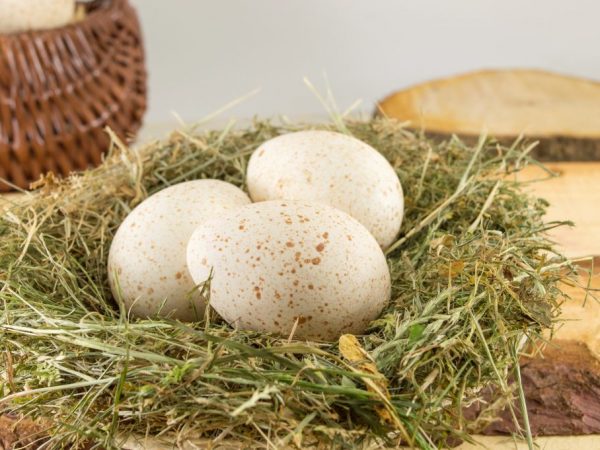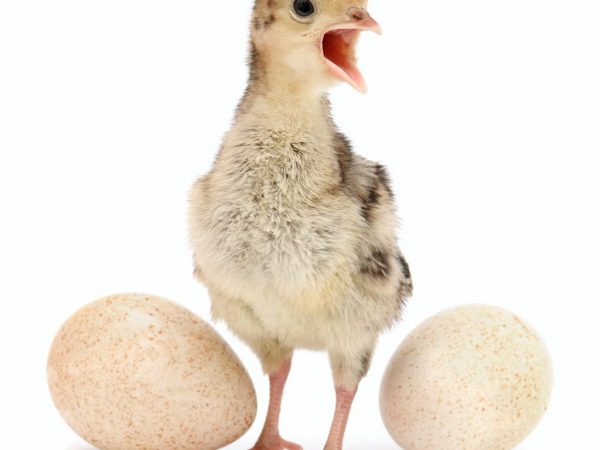How many days does a farm turkey sit on eggs
Turkeys are considered the generally recognized leaders in the amount of meat among poultry. However, in addition to gaining weight quickly, turkeys are famous for their egg production and act well as hens. These birds often lay eggs of other species, since a large turkey is able to provide warmth to a large clutch. How much turkey sits on the eggs depends primarily on external factors and the size of the clutch. There is a table of norms in which the number of eggs hatched depends on the age and weight of the individual. Also, maternal instinct in unclean breeds or crosses may be absent.

Features of turkey egg production
Features of turkey egg production
Turkey eggs are in great demand in the market for their high calorie content and large size. They also have a strong shell, which makes them easy to transport. One egg can weigh 70 to 90 grams. Often their mass depends on bird breeds and conditions of detention. How much calcium the turkey consumes can also affect size. The shell is usually light beige with speckled splashes. The number of eggs per year from one female depends on several factors:
- balanced diet;
- light time, usually at least ten hours;
- compliance with sanitary standards of maintenance;
- lack of noise and pungent odors near the nest;
- seasonality, in autumn egg production decreases and increases in spring;
- breed, age and weight of the turkey.
On average, one turkey lays 100 eggs per year. However, not all of them are suitable for divorce. The female begins to lay during March and September, but the autumn clutch is not used for hatching. This is due to the fact that it is more difficult to raise full-fledged turkey poults in winter. At this time, the future offspring of other poultry can be planted on it.
Females willingly hatch ducklings and chickens. The turkey incubates eggs for four weeks, but the female may not be able to survive the entire period. How long turkeys hatch a clutch directly depends on the conditions of detention and diet.
The hatching process
In order for the turkey to withstand the entire incubation period, it should be correct arrange a nest... The female, which is preparing to postpone the clutch, begins to build the perch on her own, but it is better to prepare the nest in advance. Several perches should be made, as the turkeys are very demanding on the place of incubation. There should be no loud sounds or strong smells near the nest, it is forbidden to admit cats or dogs to it.
A well-organized clutch is also an important aspect in turkey breeding. As soon as the female begins to lay eggs, they are taken to another room with a temperature of 14 to 17 degrees Celsius. The eggs are marked with a marker and then sorted by size. The formed clutch can be placed in the nest of the brood hen.
Turkeys are distinguished by a developed maternal instinct, so sometimes they may not get up from their eggs for days. Many breeders set up a feeder and drinker near the females so that they are not exhausted. If the turkey has not gone out for a walk for several days, then it should be taken out on its own.A weakened female may not survive for four weeks and die.
You can install a feeder with sour or milk near the walking of the bearing females. These foods replenish the body's calcium stores and help the turkey stay on longer. perch... There should also be vegetables, sprouted grain and a container with sand for bathing near the place of hatching.

Turkeys love cleanliness
A feature of turkeys is their love of cleanliness and order. The nest should be cleaned as soon as the female stops laying eggs, otherwise the turkey may not want to hatch dirty clutches.
In order for the female to lay more eggs, additional lighting is installed in the room. However, it is recommended to darken the house during the hatching period.
Reasons why the incubation period has decreased
Some females may refuse to hatch eggs. This happens much less often than in chickens, since even in crosses the maternal instinct is very well developed. Among the reasons that influenced turkeys are the following:
- Unbalanced diet and violation of sanitary standards of maintenance.
- Diseases.
- Careless actions of the farmer or pets.
- Feature of the breed.
Sometimes such females can be taught to the nest by seating the individual on the clutch and covering it with a box or box on top. This calms the bird and helps it get used to the eggs. In some cases, one or two boiled eggs are placed under the female daily to awaken the maternal instinct.
Sometimes, after several days, the turkey may abandon the clutch and not return to the nest after walking. The most common cause of the interrupted period is the stress experienced by the bird. Therefore, do not allow other pets and birds to enter the nest, and also reduce the noise level.
If this happens, then the eggs should be placed in another hen. Before this, it is advisable to process the hands and clutch with wormwood so that the female is not disturbed by the human smell. Turkeys are calm about other people's eggs and can even replace each other when one female goes for a walk.
If it happens that there are no free females and there is nowhere to put the refuseniks, then you can use the turkey for incubation. Among the males, there are also owners of the offspring protection instinct. It should be borne in mind that turkeys are larger than females, so the eggs must have a strong shell.
The male is put on the clutch, and then covered with a box or basket on top. After a while, you can remove the restriction. Observe the behavior of the bird - if the male flies out of the nest, then he will not hatch eggs. The turkeys that remained in place sit for the same period as the female. It is only important to provide the male with food, otherwise he will also refuse to lay.
Conclusion
The period and process of incubating eggs by a turkey depends on factors such as the breed, age and conditions of the individual. On average, one female incubates eggs within a month. The hens must be carefully looked after and made sure that they do not sit out in the nests. If the female refuses to leave the clutch, then a feeder and a drinker should be installed next to the bird.
Otherwise, the turkey may die of starvation. If the turkey eats well, walks and incubates eggs in a calm atmosphere, then the bird will calmly withstand all the deadlines and bring out the maximum number of turkeys.


